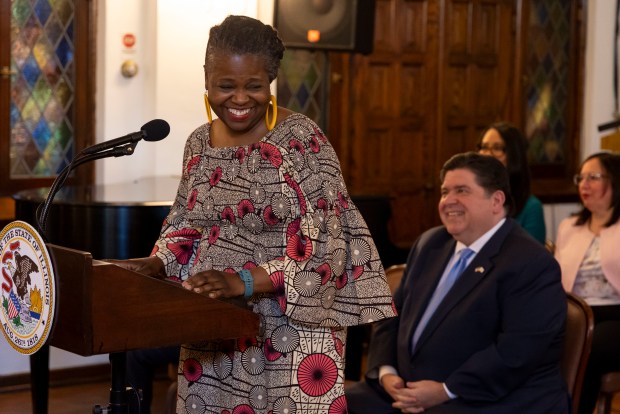Gov. J.B. Pritzker on Monday joined advocates to call for a slate of new protections for pregnant people and new mothers, including a child tax credit, support for community-based providers and measures to make doulas and midwives more accessible.
“There’s no freedom of choice without access to a full spectrum of reproductive health care for women and new mothers,” Pritzker said, standing beside stained glass windows in a Southeast Side church building that could soon become the area’s first free-standing birthing center.
The event and Pritzker’s remarks underscored his push for the General Assembly to prioritize the maternal health and “birth equity” funding initiatives in his budget. It was his public appearance in Illinois since he unveiled his budget in an address to legislators in Springfield last week, a speech that traditionally has kicked off a series of events around the state to sell the spending plan.
Pritzker’s $52.7 billion budget calls for $23 million to advance “birth equity” in a state where Black women are three times as likely to die from pregnancy-related medical conditions as white women, according to an Illinois Department of Public Health study covering the years 2018 to 2020.
That funding includes $12 million for a child tax credit for low- and moderate-income families with children under age 3, plus greater investments in community health care providers, the state’s home visitation program and a pilot program for free diapers. The spending plan has to be approved by the legislature, but Pritzker’s priorities will be buoyed by Democratic supermajorities in both chambers.
The governor called the maternal mortality disparities a “shame.”
“Let’s attack this problem where it is, and where it’s most acute,” said Pritzker, who made reproductive health a centerpiece of his 2022 reelection campaign.
Appearing with Pritzker at Monday’s event were House Majority leader Robyn Gabel of Evanston and Democratic Sen. Lakesia Collins of Chicago, who pushed for legislation backed by Pritzker that would require private insurers to cover services from doulas, certified midwives and lactation consultants.
The facility where Pritzker, lawmakers and some state department heads spoke until just weeks ago housed a church. But advocates for maternal health recently purchased it in anticipation of converting it into a center for reproductive health and birth, the Chicago South Side Birth Center, said Jeanine Valrie Logan, the center’s founder.

While the center still has work ahead before becoming a reality, including raising some $3.5 million for construction, it could eventually benefit from the type of funding Pritzker is pushing for in his budget, Valrie Logan said in an interview.
“We still have a long way to go before we are open and catching babies in this very room,” she said. “Purchasing this building was one of the many, many, many, many milestones.”
As families seek support beyond birth, a child tax credit could become a bipartisan point of agreement as budget negotiations unfold over the next few months. Still, some progressive lawmakers have called for an even more robust credit for families with children up to age 18.
“I think we need to go bigger and bolder on it, so that we really can make a difference for working families that are struggling to keep the lights on,” Sen. Mike Simmons of Chicago, the sponsor of legislation that goes beyond Pritzker’s proposal, said late last week.
Lt. Gov. Juliana Stratton on Monday said Black women in America have “never really been afforded” the peace of mind that they will safely deliver a baby and be able to raise the child in a healthy environment.
Investing in providers that are trusted by their communities can help “repair this generational harm,” she said.
“Being Black is not a risk factor,” Stratton said. “Continuing a system built on oppression and ignorance is.”
Olivia Olander , 2024-02-26 23:53:46
Source link


